|
Every revolution
starts small, so small that most people do not realise there is
one underway. By the time they do, it is too late. Going purely
by the simplistic logic that the sample that came up from this
year's informal polling of consultants, headhunters, analysts
and know-it-all corporate types (the same methodology used to
generate the list of the most powerful women in Indian business
in previous editions of the survey) was larger than anything that
had come up in previous years, India Inc. could well be standing
on the brink of a revolution. The number of women in senior executive
positions seems to be on the rise, especially in businesses such
as banking and financial services. It will be a while before men
become the other sex at the workplace-realistically speaking,
it may never be-but right now, it is time to forget everything
else and celebrate our Power 25. They deserve it.
 Vinita
Bali Vinita
Bali
50/CEO/Britannia Industries
She has headed
the strategy function for Coca-Cola (globally), overseen the company's
Andean business and worked as a consultant with marketing whiz
Sergio Zyman's consulting firm. Now she is working her quiet kind
of magic at Britannia.
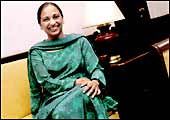 Vedika
Bhandarkar Vedika
Bhandarkar
37/MD & Head (Investment
Banking)/JP Morgan India
Her moves are
the envy of the competition. That's only to be expected: she takes
Kathak lessons every weekend with her daughter. Seriously speaking,
however, what Bhandarkar's fellow investment bankers would like
to know is how the lady manages to seal a deal even before they
can smell it-a case in point being the mandate from the Anil Dhirubhai
Ambani Group for restructuring the Reliance Group. Much of this
has to do with the quiet aggression Bhandarkar exudes. And at
least some of it has to do with desire and her early grounding
in the tenets of banking. "I always wanted to be in finance
and I learnt a lot in the project finance division of ICICI Ltd,"
she says.
-Anand Adhikari
 Shobhana
Bhartia Shobhana
Bhartia
49/Vice Chairperson & Editorial
Director/
HT Media
Bhartia's newspaper
has held its own against the times of India in Delhi and taken
on the latter in Mumbai. The lady is now in the process of launching
a business daily to take on market leader The Economic Times.
And she has just been nominated to India's upper house of Parliament.
Elaben Bhatt
73/Founder/SEWA
Inclusion is
a buzzword that has worked its way into the corporate lexicon
in the 2000s. It simply means that companies that have hitherto
ignored the poor, even the not-so-rich, stand to gain by engaging
with these segments. Try telling that to Ela Bhatt, the lawyer-turned
activist who founded a movement called sewa (Self Employed Women's
Association), and she is sure to smile. "From making the
poor work for business, we have to make more and more businesses
work for the poor," she says, repeating something she has
said before, something that could well serve as a definition of
the term inclusion. sewa's focus is poor and self-employed women
who work in the informal sector (think maids, cooks, nannies,
farm labourers, vegetable vendors and cart-pullers), some 800,000
of them across the seven Indian states where it operates; it provides
them with banking and insurance services; healthcare; childcare
and microfinance. There's nothing Bhatt would like to see more
than the poor women she works for becoming the focus of the economic
reforms the country has embarked upon. That, an increasing number
of companies are beginning to realise, would be real growth.
-Ahona Ghosh
Neelam Dhawan
46/Managing Director/Microsoft
India
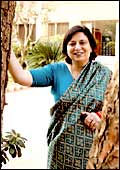 You
are the fifth woman country manager for Microsoft worldwide."
That, says Neelam Dhawan, were the first words Bill Gates spoke
to her when she met him for the first time last year. Microsoft
has 100-odd country managers and it doesn't have a reputation
as a great place to work for women (for the record, it doesn't
have the reputation of not being a great place to work for women
either); ergo, Dhawan's is some achievement. There's something
else Dhawan can be proud of: after working for 22 years in the
hardware industry (she began 22 years ago as a trainee with HCL),
she has finally ended up as the Managing Director of the India
operations of the best known software firm in the world. Initially,
Dhawan admits that she was "apprehensive about the career
shift", but says that Microsoft India Chairman Ravi Venkatesan
managed to convince her. "Both (software and hardware) are
about the deployment of it," reasons the lady. You
are the fifth woman country manager for Microsoft worldwide."
That, says Neelam Dhawan, were the first words Bill Gates spoke
to her when she met him for the first time last year. Microsoft
has 100-odd country managers and it doesn't have a reputation
as a great place to work for women (for the record, it doesn't
have the reputation of not being a great place to work for women
either); ergo, Dhawan's is some achievement. There's something
else Dhawan can be proud of: after working for 22 years in the
hardware industry (she began 22 years ago as a trainee with HCL),
she has finally ended up as the Managing Director of the India
operations of the best known software firm in the world. Initially,
Dhawan admits that she was "apprehensive about the career
shift", but says that Microsoft India Chairman Ravi Venkatesan
managed to convince her. "Both (software and hardware) are
about the deployment of it," reasons the lady.
-Sahad P.V.
 Manisha
Girotra Manisha
Girotra
36/Chairperson & Managing Director/
UBS Securities
Last year, jet
airways made a high-profile IPO (oversubscribed some 26 times),
Videocon acquired the picture tube business of French consumer
electronics major Thomson Electronics, and Vodafone acquired a
10 per cent stake in Bharti Tele-Ventures. Manisha Girotra had
a role to play in all three. And there were challenges involved
in all. In the case of the Vodafone-Bharti deal, Girotra spent
two years convincing Vodafone that there was merit in an India-play.
And in the case of the Jet IPO, she says, "There was not
too much understanding of the sector in the Indian context."
Apart from these deals, Girotra, a gold medallist from Delhi School
of Economics, has also been involved in the ADR offerings of Infosys
and ICICI Bank, and the privatisation of VSNL, IPCL and BALCO.
That makes for an interesting resume.
-Krishna Gopalan
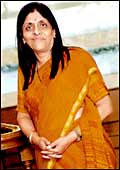 Lalita
Gupte Lalita
Gupte
57/Joint Managing Director/
ICICI Bank
An ICICI-lifer,
Gupte has held a variety of positions in the bank and is now in
charge of its international operations. She was the first in a
long and growing list of women who have established beyond doubt
that ICICI Bank doesn't have any glass ceilings.
Ekta Kapoor
30/Creative Director/Balaji Telefilms
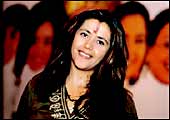 She
is the undisputed queen of Indian television, with her programmes
(largely soaps) safely ensconced in the top 24 positions in the
list of the top 50 programmes on the tube. "I create concepts
by instinct," says Ekta Kapoor. Well, her instincts seem
to have a keen insight into the collective psyche of Indians,
largely women who swear by her soaps. Much of that has to do with
Kapoor's conviction that Indians are "an emotional audience".
Thus, her soaps shun the complex New Woman some producers of TV
soaps and motion pic makers are beginning to depict. The interesting
thing: despite everyone seeming to know what Balaji's formula
is, no one has been able to reproduce it. Maybe there is something
instinctive about Kapoor's creative process. She
is the undisputed queen of Indian television, with her programmes
(largely soaps) safely ensconced in the top 24 positions in the
list of the top 50 programmes on the tube. "I create concepts
by instinct," says Ekta Kapoor. Well, her instincts seem
to have a keen insight into the collective psyche of Indians,
largely women who swear by her soaps. Much of that has to do with
Kapoor's conviction that Indians are "an emotional audience".
Thus, her soaps shun the complex New Woman some producers of TV
soaps and motion pic makers are beginning to depict. The interesting
thing: despite everyone seeming to know what Balaji's formula
is, no one has been able to reproduce it. Maybe there is something
instinctive about Kapoor's creative process.
-Ahona Ghosh
Renu Karnad
53/Executive Director/ HDFC
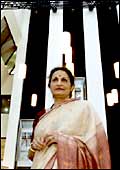 Renu
Karnad is just back from a 10-day trip to Japan and Australia.
She travels a lot, to strike alliances, discuss where the Indian
housing finance business is going with HDFC's international partners,
or to simply reassure investors (foreign holding in HDFC is around
78 per cent) that India's real estate boom is for real. "People
outside are worried whether we can sustain the growth rate,"
says Karnad. In some ways, the lady could well be the ambassador
for India's property business. Karnad is #3 in terms of HDFC's
hierarchy. Deepak Parekh is Chairman and Keki Mistry, Managing
Director, but as the head of the retail and corporate lending
operations at HDFC, she is indubitably the most important person
in India's housing mortgage industry. Renu
Karnad is just back from a 10-day trip to Japan and Australia.
She travels a lot, to strike alliances, discuss where the Indian
housing finance business is going with HDFC's international partners,
or to simply reassure investors (foreign holding in HDFC is around
78 per cent) that India's real estate boom is for real. "People
outside are worried whether we can sustain the growth rate,"
says Karnad. In some ways, the lady could well be the ambassador
for India's property business. Karnad is #3 in terms of HDFC's
hierarchy. Deepak Parekh is Chairman and Keki Mistry, Managing
Director, but as the head of the retail and corporate lending
operations at HDFC, she is indubitably the most important person
in India's housing mortgage industry.
-Sahad P.V.
 Chanda
Kochhar Chanda
Kochhar
45/Executive Director/
ICICI Bank
She is the lady
behind ICICI Bank's aggressive (and successful) retail play and
is widely tipped to succeed K.V. Kamath as CEO when he retires.
Naina Lal Kidwai
48/Deputy CEO/HSBC
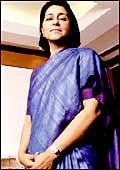 In
her own words, the past year has been one "filled with interesting
changes" for Naina Lal Kidwai. The first Indian woman to
graduate from Harvard Business School may also be the first Indian
woman to sit on the board of a multinational (she will, in all
likelihood, be elected to the board of Nestle SA in April), but
she'd rather talk about the bank's achievements in India where
it grew its retail business and became a significant player in
the fund management space. "Across businesses, we have done
well," she says. "It has been a year where we took a
lot of initiatives and encountered several successes." India,
it is evident, is important to HSBC; the bank's global board met
in Mumbai and Delhi last November and it hopes to become a large
player in the retail banking business in the country. For Kidwai,
who has been-there-done-that in several high-profile postings,
and who can be excused for slowing down (not that the lady is
having any of that), this, is time to "reset one's goals". In
her own words, the past year has been one "filled with interesting
changes" for Naina Lal Kidwai. The first Indian woman to
graduate from Harvard Business School may also be the first Indian
woman to sit on the board of a multinational (she will, in all
likelihood, be elected to the board of Nestle SA in April), but
she'd rather talk about the bank's achievements in India where
it grew its retail business and became a significant player in
the fund management space. "Across businesses, we have done
well," she says. "It has been a year where we took a
lot of initiatives and encountered several successes." India,
it is evident, is important to HSBC; the bank's global board met
in Mumbai and Delhi last November and it hopes to become a large
player in the retail banking business in the country. For Kidwai,
who has been-there-done-that in several high-profile postings,
and who can be excused for slowing down (not that the lady is
having any of that), this, is time to "reset one's goals".
-Krishna Gopalan
 Punita
Lal Punita
Lal
43/Executive Director (Marketing)/PepsiCo
India
There is some
poetic justice to the fact that Punita Lal is the person in charge
of Pepsi's marketing efforts in India. Circa 1992, it was the
same Punita Lal, then an executive with J. Walter Thompson India
(then Hindustan Thompson Associates) who mid-wifed the brand's
launch commercial. The ad, with the punchline Are You Ready For
The Magic and featuring Indipop singer Remo Fernandes and Bollywood's
favourite girl-next-door Juhi Chawla, was a hit, and Lal, who
also gave birth to a son the same year, says it remains the one
"closest to her heart". In her 17-year long career,
Lal, an alumnus of Delhi's St Stephen's College and Indian Institute
of Management, Calcutta, has been an advertising executive, then
a brand director with Coke (in Hong Kong), before moving to her
current assignment. "I enjoyed every bit of advertising,"
she says, but adds that shifting to the other side of the table
made sense as she wanted to get the most out of her career. "Working
for Pepsi, by far, has been the most challenging and fulfilling
phase of my career," says Lal. She, apparently, is ready
for the magic.
-Archna Shukla
 Kiran
Mazumdar-Shaw Kiran
Mazumdar-Shaw
52/Chairman and
Managing Director/Biocon
India's richest
woman, Kiran Mazumdar-Shaw isn't just the founding CEO of the
country's best-known and most respected biotech company; she is
also a torch-bearer for the entire biotech industry.
 Zia
Mody Zia
Mody
49/Partner/AZB & Partners
Increased corporate
activity equals more work for lawyers. Just ask Zia Mody. Last
year, she was involved in Tata Steel's acquisition of Natsteel,
Maxis' of Aircel, and she represented Mukesh Ambani in the settlement
he hammered out with his brother. Many of these deals have been
high-profile ones and Mody, the daughter of India's former Attorney
General Soli Sorabjee, thinks that is good. "There has been
a higher profiling of our practice in the past year," she
says. "Over the next five years, we will hopefully be more
successful. The kick is in creating an institution." Legal
circles would vouch for the fact that the lady, who was also elected
to the board of directors of HSBC, is one herself.
-Krishna Gopalan
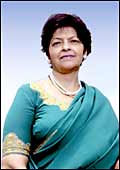 Kalpana
Morparia Kalpana
Morparia
57/Deputy Managing Director/ICICI
Bank
The versatile
Morparia is ICICI Bank's preferred troubleshooter, and oversees
a range of functions from legal to hr to strategy to risk management
to treasury management.
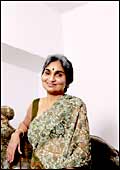 Amrita
Patel Amrita
Patel
62/Chairperson/
National Dairy Development Board
Amrita Patel
is probably in her last (it is her second) term as Chairperson
of the National Dairy Development Board and could retire by 2008.
By then, the First Lady of the Indian co-operative movement would
like to see co-operatives everywhere. Patel is clearly in a hurry;
she knows that in the wake of increased competition from the private
sector, co-operatives have to become efficient. For instance,
she wants to link the auction mechanisms in rural marketplaces
"to commodity exchanges, to make the whole system transparent".
This, she claims, "will benefit the farmer". That'll
take some doing.
-Archna Shukla
Falguni Nayar
43/Managing Director/Kotak Mahindra
Capital
 For
eight-and-a-half years after she graduated from IIM-A, Falguni
Nayar worked with A.F. Ferguson. In late 1993, she moved to Kotak
Mahindra Finance to oversee M&A and corporate advisory. In
1994, her husband, Sanjay Nayar, now CEO, Citigroup (India) and
a high-flier in Citibank even then was posted, first in the UK,
and the US. Falguni saw this as an opportunity and offered to
set up Kotak's international equity business. The business bloomed
and in the early 2000s, the lady returned to India to head Kotak's
institutional equity business. In June 2005, she was asked to
head the company's investment bank. "The capital market is
all about today while investment banking is about developing business
strategies for the next five years," says Nayar, a mother
of two, and swimming enthusiast who still finds the time for Bollywood's
latest. For
eight-and-a-half years after she graduated from IIM-A, Falguni
Nayar worked with A.F. Ferguson. In late 1993, she moved to Kotak
Mahindra Finance to oversee M&A and corporate advisory. In
1994, her husband, Sanjay Nayar, now CEO, Citigroup (India) and
a high-flier in Citibank even then was posted, first in the UK,
and the US. Falguni saw this as an opportunity and offered to
set up Kotak's international equity business. The business bloomed
and in the early 2000s, the lady returned to India to head Kotak's
institutional equity business. In June 2005, she was asked to
head the company's investment bank. "The capital market is
all about today while investment banking is about developing business
strategies for the next five years," says Nayar, a mother
of two, and swimming enthusiast who still finds the time for Bollywood's
latest.
-Anand Adhikari
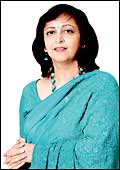 Swati
Piramal Swati
Piramal
49/Director (Strategic Alliances
& Communications)/
Nicholas Piramal
Swati Piramal
is in the prime of her organisational life. "Women typically
peak after the age of 40 because they lose time in bringing up
children," she says. "And in a sphere like scientific
research (which she is in), they end up losing more years in academics."
Factoring all that in, 2005 must rank as a great year for Piramal.
"We became a global company with two acquisitions in the
UK," says the lady who was also nominated to the Prime Minister's
Scientific Advisory Board last year. "I am the only woman
there," she adds proudly. Then came appointments to the boards
of LIC and State Bank of India. All that in one year.
-Krishna Gopalan
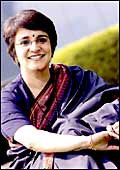 Madhabi
Puri-Buch Madhabi
Puri-Buch
39/Sr GM & Country Head
(Customer Delivery and Ops, Products
and Technology,
and Brand Mgmt)/ ICICI Bank
She took a four-year
break from ICICI to be with her family in the UK (where her husband
was posted at the time), but has since worked her way to overseeing
three of the bank's most critical functions, customer delivery,
brand management and technology.
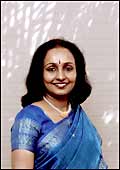 Renuka
Ramnath Renuka
Ramnath
45/CEO/ICICI Venture
Renuka Ramnath heads one of the largest
private equity funds in the country, and as the deal with Dr Reddy's
to share risks and rewards of the drug discovery process shows,
one that is probably the most innovative of its species in India.
Preetha Reddy
48/Managing Director/Apollo Hospitals
Group
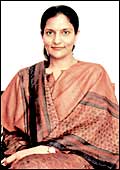 I
always wanted to be a doctor," says the 48-year-old Preetha
Reddy, a chemistry graduate. Well, in this case, medicine's loss
has been medicine's gain. Reddy has ended up at the helm of the
country's largest organised healthcare business-quite the best
compromise possible. Her fascination with healthcare shows. As
Managing Director, she has taken the Apollo Group to new geographies
and new frontiers of quality and technology. "Access to medical
care is the chief issue today in India," she says. Today,
the Rs 800-crore Apollo Group owns 23 hospitals with 4,000 beds
at over 10 locations, and manages an additional 2,700 beds across
14 locations, and runs a sprawling retail pharmacy chain of over
200 stores. Woman power rules at Apollo, with all four Reddy sisters
actively involved in the group's management. When Reddy came into
the business, she recalls having to start from scratch, but "in
the healthcare industry, you learn a lot by standing on your feet",
she says. I
always wanted to be a doctor," says the 48-year-old Preetha
Reddy, a chemistry graduate. Well, in this case, medicine's loss
has been medicine's gain. Reddy has ended up at the helm of the
country's largest organised healthcare business-quite the best
compromise possible. Her fascination with healthcare shows. As
Managing Director, she has taken the Apollo Group to new geographies
and new frontiers of quality and technology. "Access to medical
care is the chief issue today in India," she says. Today,
the Rs 800-crore Apollo Group owns 23 hospitals with 4,000 beds
at over 10 locations, and manages an additional 2,700 beds across
14 locations, and runs a sprawling retail pharmacy chain of over
200 stores. Woman power rules at Apollo, with all four Reddy sisters
actively involved in the group's management. When Reddy came into
the business, she recalls having to start from scratch, but "in
the healthcare industry, you learn a lot by standing on your feet",
she says.
-Vaishna Roy
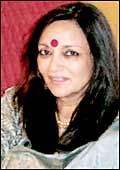 Radhika
Roy Radhika
Roy
56/Managing Director/NDTV
For a managing
director of a media company, and for someone who decided long
ago that journalism was where her "heart and mind" was,
Radhika Roy is an extremely low-profile individual (something
made just a little more surprising by the fact that her sister
is the in-your-face Brinda Karat, one of the leading lights of
the CPI-M). A qualified speech pathologist, Radhika met her husband
Prannoy Roy when they were both students in London; both wanted
to be journalists.
She realised that dream (of being a journalist)
in 1978, and after a decade spent equally at The Indian Express
and India Today, she and her husband decided to launch their own
TV production company. In 1988, NDTV was born, an original garage
start-up: Radhika and Prannoy did everything "from writing
scripts to editing". Today, NDTV is a 1,200-people strong
full-fledged broadcaster with three round-the-clock channels,
it is a listed company and Radhika has moved on from journalist
to Managing Director.
The past year has been challenging: competition
has intensified; the pressures of being listed (and having analysts
assess performance quarter on quarter) are considerable; and several
senior employees have moved on. "More than anything, it has
been a learning experience," says Radhika. Still, she thinks
NDTV's "commitment to credible journalism" will see
it through. That it should.
-Archna Shukla
 Shikha
Sharma Shikha
Sharma
47/CEO/ICICI Prudential Life Insurance
The alumnus
of Indian institute of Management, Ahmedabad has the reputation
of being a start-up pro. And ICICI Pru Life is the largest private
sector life insurer in the country.
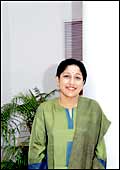 Mallika
Srinivasan Mallika
Srinivasan
45/Director/ Tractors and
Farm Equipment
The quiet and
low-profile Mallika Srinivasan is the unsung heiress of a quieter
and even more low-profile (if that is possible) group, the Chennai-based
Amalgamations.
Preeti Vyas Giannetti
49/CEO/Vyas Giannetti Creative
 Rumoured
to be the most expensive advertisement ever made for an Indian
company, the new commercial for the Aditya Birla Group meshes
the group's Indianness with its global footprint (it is a multinational
group with manufacturing locations in nine countries) into a visually
compelling whole of the kind one has come to expect from its creator
Vyas Giannetti Creative (VGC). If VGC is different it is because
the agency believes that it can marry the creative process with
the brand management one. "I wanted to create an organisation
that derives its culture from my own experience," asserts
Preeti Vyas Giannetti who insists that everyone leaves work by
7.30 p.m. (they need permission to stay back). "Everyone's
inspiration comes from life," she says, explaining why it
is essential to strike a balance. For instance, the single mother
manages to have lunch with her daughter every day. Rumoured
to be the most expensive advertisement ever made for an Indian
company, the new commercial for the Aditya Birla Group meshes
the group's Indianness with its global footprint (it is a multinational
group with manufacturing locations in nine countries) into a visually
compelling whole of the kind one has come to expect from its creator
Vyas Giannetti Creative (VGC). If VGC is different it is because
the agency believes that it can marry the creative process with
the brand management one. "I wanted to create an organisation
that derives its culture from my own experience," asserts
Preeti Vyas Giannetti who insists that everyone leaves work by
7.30 p.m. (they need permission to stay back). "Everyone's
inspiration comes from life," she says, explaining why it
is essential to strike a balance. For instance, the single mother
manages to have lunch with her daughter every day.
-Ahona Ghosh
|




 Vinita
Bali
Vinita
Bali  Vedika
Bhandarkar
Vedika
Bhandarkar Shobhana
Bhartia
Shobhana
Bhartia  You
are the fifth woman country manager for Microsoft worldwide."
That, says Neelam Dhawan, were the first words Bill Gates spoke
to her when she met him for the first time last year. Microsoft
has 100-odd country managers and it doesn't have a reputation
as a great place to work for women (for the record, it doesn't
have the reputation of not being a great place to work for women
either); ergo, Dhawan's is some achievement. There's something
else Dhawan can be proud of: after working for 22 years in the
hardware industry (she began 22 years ago as a trainee with HCL),
she has finally ended up as the Managing Director of the India
operations of the best known software firm in the world. Initially,
Dhawan admits that she was "apprehensive about the career
shift", but says that Microsoft India Chairman Ravi Venkatesan
managed to convince her. "Both (software and hardware) are
about the deployment of it," reasons the lady.
You
are the fifth woman country manager for Microsoft worldwide."
That, says Neelam Dhawan, were the first words Bill Gates spoke
to her when she met him for the first time last year. Microsoft
has 100-odd country managers and it doesn't have a reputation
as a great place to work for women (for the record, it doesn't
have the reputation of not being a great place to work for women
either); ergo, Dhawan's is some achievement. There's something
else Dhawan can be proud of: after working for 22 years in the
hardware industry (she began 22 years ago as a trainee with HCL),
she has finally ended up as the Managing Director of the India
operations of the best known software firm in the world. Initially,
Dhawan admits that she was "apprehensive about the career
shift", but says that Microsoft India Chairman Ravi Venkatesan
managed to convince her. "Both (software and hardware) are
about the deployment of it," reasons the lady. Manisha
Girotra
Manisha
Girotra Lalita
Gupte
Lalita
Gupte 
 Renu
Karnad is just back from a 10-day trip to Japan and Australia.
She travels a lot, to strike alliances, discuss where the Indian
housing finance business is going with HDFC's international partners,
or to simply reassure investors (foreign holding in HDFC is around
78 per cent) that India's real estate boom is for real. "People
outside are worried whether we can sustain the growth rate,"
says Karnad. In some ways, the lady could well be the ambassador
for India's property business. Karnad is #3 in terms of HDFC's
hierarchy. Deepak Parekh is Chairman and Keki Mistry, Managing
Director, but as the head of the retail and corporate lending
operations at HDFC, she is indubitably the most important person
in India's housing mortgage industry.
Renu
Karnad is just back from a 10-day trip to Japan and Australia.
She travels a lot, to strike alliances, discuss where the Indian
housing finance business is going with HDFC's international partners,
or to simply reassure investors (foreign holding in HDFC is around
78 per cent) that India's real estate boom is for real. "People
outside are worried whether we can sustain the growth rate,"
says Karnad. In some ways, the lady could well be the ambassador
for India's property business. Karnad is #3 in terms of HDFC's
hierarchy. Deepak Parekh is Chairman and Keki Mistry, Managing
Director, but as the head of the retail and corporate lending
operations at HDFC, she is indubitably the most important person
in India's housing mortgage industry. Chanda
Kochhar
Chanda
Kochhar  In
her own words, the past year has been one "filled with interesting
changes" for Naina Lal Kidwai. The first Indian woman to
graduate from Harvard Business School may also be the first Indian
woman to sit on the board of a multinational (she will, in all
likelihood, be elected to the board of Nestle SA in April), but
she'd rather talk about the bank's achievements in India where
it grew its retail business and became a significant player in
the fund management space. "Across businesses, we have done
well," she says. "It has been a year where we took a
lot of initiatives and encountered several successes." India,
it is evident, is important to HSBC; the bank's global board met
in Mumbai and Delhi last November and it hopes to become a large
player in the retail banking business in the country. For Kidwai,
who has been-there-done-that in several high-profile postings,
and who can be excused for slowing down (not that the lady is
having any of that), this, is time to "reset one's goals".
In
her own words, the past year has been one "filled with interesting
changes" for Naina Lal Kidwai. The first Indian woman to
graduate from Harvard Business School may also be the first Indian
woman to sit on the board of a multinational (she will, in all
likelihood, be elected to the board of Nestle SA in April), but
she'd rather talk about the bank's achievements in India where
it grew its retail business and became a significant player in
the fund management space. "Across businesses, we have done
well," she says. "It has been a year where we took a
lot of initiatives and encountered several successes." India,
it is evident, is important to HSBC; the bank's global board met
in Mumbai and Delhi last November and it hopes to become a large
player in the retail banking business in the country. For Kidwai,
who has been-there-done-that in several high-profile postings,
and who can be excused for slowing down (not that the lady is
having any of that), this, is time to "reset one's goals".
 Punita
Lal
Punita
Lal Kiran
Mazumdar-Shaw
Kiran
Mazumdar-Shaw Zia
Mody
Zia
Mody Kalpana
Morparia
Kalpana
Morparia Amrita
Patel
Amrita
Patel For
eight-and-a-half years after she graduated from IIM-A, Falguni
Nayar worked with A.F. Ferguson. In late 1993, she moved to Kotak
Mahindra Finance to oversee M&A and corporate advisory. In
1994, her husband, Sanjay Nayar, now CEO, Citigroup (India) and
a high-flier in Citibank even then was posted, first in the UK,
and the US. Falguni saw this as an opportunity and offered to
set up Kotak's international equity business. The business bloomed
and in the early 2000s, the lady returned to India to head Kotak's
institutional equity business. In June 2005, she was asked to
head the company's investment bank. "The capital market is
all about today while investment banking is about developing business
strategies for the next five years," says Nayar, a mother
of two, and swimming enthusiast who still finds the time for Bollywood's
latest.
For
eight-and-a-half years after she graduated from IIM-A, Falguni
Nayar worked with A.F. Ferguson. In late 1993, she moved to Kotak
Mahindra Finance to oversee M&A and corporate advisory. In
1994, her husband, Sanjay Nayar, now CEO, Citigroup (India) and
a high-flier in Citibank even then was posted, first in the UK,
and the US. Falguni saw this as an opportunity and offered to
set up Kotak's international equity business. The business bloomed
and in the early 2000s, the lady returned to India to head Kotak's
institutional equity business. In June 2005, she was asked to
head the company's investment bank. "The capital market is
all about today while investment banking is about developing business
strategies for the next five years," says Nayar, a mother
of two, and swimming enthusiast who still finds the time for Bollywood's
latest.  Swati
Piramal
Swati
Piramal Madhabi
Puri-Buch
Madhabi
Puri-Buch Renuka
Ramnath
Renuka
Ramnath I
always wanted to be a doctor," says the 48-year-old Preetha
Reddy, a chemistry graduate. Well, in this case, medicine's loss
has been medicine's gain. Reddy has ended up at the helm of the
country's largest organised healthcare business-quite the best
compromise possible. Her fascination with healthcare shows. As
Managing Director, she has taken the Apollo Group to new geographies
and new frontiers of quality and technology. "Access to medical
care is the chief issue today in India," she says. Today,
the Rs 800-crore Apollo Group owns 23 hospitals with 4,000 beds
at over 10 locations, and manages an additional 2,700 beds across
14 locations, and runs a sprawling retail pharmacy chain of over
200 stores. Woman power rules at Apollo, with all four Reddy sisters
actively involved in the group's management. When Reddy came into
the business, she recalls having to start from scratch, but "in
the healthcare industry, you learn a lot by standing on your feet",
she says.
I
always wanted to be a doctor," says the 48-year-old Preetha
Reddy, a chemistry graduate. Well, in this case, medicine's loss
has been medicine's gain. Reddy has ended up at the helm of the
country's largest organised healthcare business-quite the best
compromise possible. Her fascination with healthcare shows. As
Managing Director, she has taken the Apollo Group to new geographies
and new frontiers of quality and technology. "Access to medical
care is the chief issue today in India," she says. Today,
the Rs 800-crore Apollo Group owns 23 hospitals with 4,000 beds
at over 10 locations, and manages an additional 2,700 beds across
14 locations, and runs a sprawling retail pharmacy chain of over
200 stores. Woman power rules at Apollo, with all four Reddy sisters
actively involved in the group's management. When Reddy came into
the business, she recalls having to start from scratch, but "in
the healthcare industry, you learn a lot by standing on your feet",
she says. Radhika
Roy
Radhika
Roy Shikha
Sharma
Shikha
Sharma Mallika
Srinivasan
Mallika
Srinivasan Rumoured
to be the most expensive advertisement ever made for an Indian
company, the new commercial for the Aditya Birla Group meshes
the group's Indianness with its global footprint (it is a multinational
group with manufacturing locations in nine countries) into a visually
compelling whole of the kind one has come to expect from its creator
Vyas Giannetti Creative (VGC). If VGC is different it is because
the agency believes that it can marry the creative process with
the brand management one. "I wanted to create an organisation
that derives its culture from my own experience," asserts
Preeti Vyas Giannetti who insists that everyone leaves work by
7.30 p.m. (they need permission to stay back). "Everyone's
inspiration comes from life," she says, explaining why it
is essential to strike a balance. For instance, the single mother
manages to have lunch with her daughter every day.
Rumoured
to be the most expensive advertisement ever made for an Indian
company, the new commercial for the Aditya Birla Group meshes
the group's Indianness with its global footprint (it is a multinational
group with manufacturing locations in nine countries) into a visually
compelling whole of the kind one has come to expect from its creator
Vyas Giannetti Creative (VGC). If VGC is different it is because
the agency believes that it can marry the creative process with
the brand management one. "I wanted to create an organisation
that derives its culture from my own experience," asserts
Preeti Vyas Giannetti who insists that everyone leaves work by
7.30 p.m. (they need permission to stay back). "Everyone's
inspiration comes from life," she says, explaining why it
is essential to strike a balance. For instance, the single mother
manages to have lunch with her daughter every day.